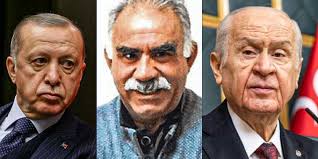The recent statements by MHP leader Devlet Bahçeli have brought renewed attention to the imprisoned PKK leader Abdullah Öcalan and a potential new political process involving the Kurdish issue. Bahçeli, once a staunch advocate for Öcalan’s execution, has surprised many by suggesting that Öcalan could use the “right to hope” to call on the PKK to lay down arms. This suggestion comes alongside rumors of legal amendments that could allow for the conditional release of convicts serving aggravated life sentences, including Öcalan, after 25 years in prison.
A key part of the proposed process could involve Öcalan making a public statement, possibly at the pro-Kurdish DEM Party’s parliamentary group, urging an end to the PKK’s armed struggle. These developments hint at a significant shift, with Bahçeli, who has previously been fiercely opposed to the Kurdish political movement, playing a leading role. His handshake with DEM Party executives on October 1, 2023, signaled a potential shift toward a new solution process.
The rumors surrounding this process suggest that state officials have been in secret talks with Öcalan for some time, possibly with Öcalan already in communication with PKK leadership in Qandil. These discussions reportedly aim at a comprehensive peace settlement, with issues such as education in the Kurdish language, constitutional equality, and the status of Syria’s Kurdish regions (Rojava) possibly on the table.
The possibility of Öcalan’s release, even under house arrest, could reignite political tensions. The public and opposition parties, particularly the CHP, are skeptical, fearing that President Erdoğan might be using this process to regain Kurdish support ahead of potential early elections. Erdoğan’s previous involvement in a peace process with the Kurds, which ended in 2015 amid political backlash and terrorist attacks, led to the collapse of negotiations and renewed conflict.
Regional dynamics, including Turkey’s complex relations with the Iraqi Kurdistan Regional Government and the situation in Gaza, are also critical factors shaping this process. The evolving Kurdish question across the Middle East is seen as a key driver behind Turkey’s potential shift toward peace rather than confrontation. Bahçeli’s statements suggest that Turkey is now looking to resolve ethnic conflicts through dialogue with the most radical actors, a move that breaks new ground in Turkish nationalism and reflects coordinated planning at the state level.
